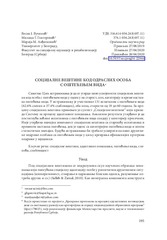Приказ основних података о документу
Socijalne veštine kod odraslih osoba s oštećenjem vida
Social skills in adults with visual impairment
| dc.creator | Vučinić, Vesna | |
| dc.creator | Gligorović, Milica | |
| dc.creator | Anđelković, Marija | |
| dc.date.accessioned | 2021-06-09T14:33:11Z | |
| dc.date.available | 2021-06-09T14:33:11Z | |
| dc.date.issued | 2020 | |
| dc.identifier.issn | 0085-6320 | |
| dc.identifier.uri | http://rfasper.fasper.bg.ac.rs/handle/123456789/1287 | |
| dc.description.abstract | The research aim is to establish the level of acquisition of social skills in persons with visual impairment in relation to age, sex, category and time of visual impairment occurrence. The research included 131 participants with visual impairment (62.6% blind and 37.4% with low vision), both male and female, between 19 and 60 years old. In the assessment of social skills the subtest "Social Skills", which belongs to the Adaptive Behavior Assessment System, was applied. The result analysis has established that the achievements of the majority of the participants with visual impairment belong to the category of the average. No significant relation was established between social skills and the age of the participants and the time of visual impairment occurrence, whereas the relation with the category of visual impairment and sex is statistically significant. Future research should be directed at the level of social support to persons with visual impairment for the purpose of creating more efficient support programs in the community. | en |
| dc.description.abstract | Cilj istraživanja je da se utvrdi nivo usvojenosti socijalnih veština kod osoba s oštećenjem vida u odnosu na starost, pol, kategoriju i vreme nastanka oštećenja vida. U istraživanju je učestvovao 131 ispitanik s oštećenjem vida (62.6% slepih i 37.4% slabovidih), oba pola, starosti od 19 do 60 godina. Za procenu socijalnih veština primenjen je suptest "Socijalne veštine" koji pripada Sistemu za procenu adaptivnog ponašanja. Analizom rezultata utvrđeno je da postignuća većine ispitanika s oštećenjem vida spadaju u kategoriju prosečnih. Nije utvrđena značajna povezanost socijalnih veština sa starošću ispitanika i vremenom nastanka oštećenja, dok je odnos sa kategorijom oštećenja vida i polom statistički značajan. Buduća istraživanja bi trebalo usmeriti na nivo društvene podrške osobama sa oštećenjem vida u cilju kreiranja efikasnijih programa podrške u zajednici. | sr |
| dc.publisher | Sociološko društvo Srbije, Beograd | |
| dc.relation | info:eu-repo/grantAgreement/MESTD/Basic Research (BR or ON)/179025/RS// | |
| dc.rights | openAccess | |
| dc.rights.uri | https://creativecommons.org/licenses/by-sa/4.0/ | |
| dc.source | Sociološki pregled | |
| dc.subject | social skills | en |
| dc.subject | adaptive behaviour | en |
| dc.subject | visual impairment | en |
| dc.subject | blindness | en |
| dc.subject | low vision | en |
| dc.subject | socijalne veštine | sr |
| dc.subject | adaptivno ponašanje | sr |
| dc.subject | oštećenje vida | sr |
| dc.subject | slepoća | sr |
| dc.subject | slabovidost | sr |
| dc.title | Socijalne veštine kod odraslih osoba s oštećenjem vida | en |
| dc.title | Social skills in adults with visual impairment | sr |
| dc.type | article | |
| dc.rights.license | BY-SA | |
| dc.citation.epage | 215 | |
| dc.citation.issue | 2 | |
| dc.citation.other | 54(2): 195-215 | |
| dc.citation.rank | M24 | |
| dc.citation.spage | 195 | |
| dc.citation.volume | 54 | |
| dc.identifier.doi | 10.5937/socpreg54-22944 | |
| dc.identifier.fulltext | http://rfasper.fasper.bg.ac.rs/bitstream/id/252/1284.pdf | |
| dc.type.version | publishedVersion |


